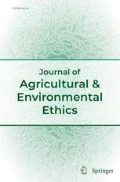Abstract
I argue that many philosophical arguments for veganism underestimate what is at stake for humans who give up eating animal products. By saying all that’s at stake for humans is taste and characterizing taste in simplistic terms, they underestimate the reasonable resistance that arguments for veganism will meet. Taste, they believe, is trivial. Omnivores, particular those that I label “meaningful omnivores,” disagree. They believe that eating meat provides a more meaningful meal, though just how this works proves elusive. Meaningful omnivores could find little in the philosophical literature to help them clarify and support their position until recently. A few philosophers have argued that our culinary practices involve something more significant than taste. I categorize these arguments into three kinds. They either argue that culinary practices are a form of artistic achievement, that our diet forms part of our identity, or that a specific diet facilitates honest engagement with the world. Each of these arguments connects some aspect of our culinary practices to living a meaningful life. I examine each argument to see if it can defend the meaningful omnivore’s position. In the end, I conclude that it cannot. Nonetheless, this argument has significant implications for the animal welfare movement. Given the intense suffering caused by contemporary animal agriculture, concern for meaning is not sufficient to justify eating meat and often dairy. Concern for meaning does, however, require that we look for ways to preserve and extend culinary traditions while making them more humane.
Similar content being viewed by others
Notes
DeGrazia (2009) draws a useful distinction between factory farms and family farms, which I’m using here (150–153).
Davis (2003) argues that a diet including the flesh of large herbivores will cause fewer animal deaths than a vegan diet; however, Andy Lamey raises some serious objections to his argument. While meaningful omnivores often appeal to arguments like Davis’s, I interpret them as offering reasons that eating meat is permissible, thereby removing a significant objection to the meaningful omnivore’s position. Davis, however, argues that eating large herbivores is morally required regardless of whether we accept the meaningful omnivore’s argument or not.
Carolyn Korsmeyer offers an interesting account of this history (Chap. 1 and 2).
From a historical point of view, African-American cooks has offered many more significant contributions. In fact, the entry on “African American Foodways” in The New Encyclopedia of Southern Culture doesn’t mention fried chicken at all.
Michael Pollan dismissively describes moral veganism as “parochial,” “urban,” and he describes it’s advocates as people who have “lost contact with the natural world” (“Animal’s Place”).
Thanks to an anonymous reviewer for this journal for pointing out this possibility.
References
Appiah, K. (2005). The ethics of identity. Princeton: Princeton University Press.
Belasco, W. (2008). Food: The key concepts. New York: Berg Publishers.
Cahoone, L. (2009). Hunting as a moral good. Environmental Values, 18(1), 67–89.
Dancy, A., & Patrick, H. (2008). Vegetarian meat: Could technology save animals and satisfy meat eaters? Journal of Agricultural and Environmental Ethics, 21, 579–596.
Davis, S. (2003). The least harm principle may require that humans consume a diet containing large herbivores, not a vegan diet. Journal of Agricultural and Environmental Ethics, 16, 387–394.
DeGrazia, D. (2009). Moral vegetarianism from a very broad basis. Journal of Moral Philosophy, 6, 143–165.
Harris, J. (2007) African American foodways. In J. T. Edge (Ed.), The new encyclopedia of southern culture: Foodways (pp. 15–18). Chapel Hill: U of North Carolina Press.
Kazez, J. (2007). The weight of things: Philosophy and the good life. Malden, MA: Blackwell Publishing.
Keuhn, G. (2004). Dining on Fido. In E. McKenna & A. Light (Eds.), Animal pragmatism (pp. 228–247). Bloomington, IN: Indiana University Press.
Kierkegaard, S. (1988). “In Vino Veritas”. A recollection related by William Afham. In H. Hong & E. Hong (Eds.), Stages on life’s way (pp. 7–86). Princeton: Princeton University Press.
Korsmeyer, C. (2002). Making sense of taste: Food and philosophy. Ithaca, NY: Cornell University Press.
Lamey, A. (2007). Food fight! Davis versus Regan on the ethics of eating beef. Journal of Social Philosophy, 38(2), 331–348.
Leone, L.E. (2008) There will be chicken blood. Slate. http://www.slate.com/id/2192934. Accessed August 1 2010.
Pollan, M. (2002) “An animal’s place”. New York Times Magazine.
Pollan, M. (2006). Omnivore’s Dilemma: A natural history of four meals. New York: Penguin Books.
Schiavocampo, M. (2010) Cook defends fried chicken choice for black history month menu. The Grio. http://www.thegrio.com/news/nbc-cook-defends-fried-chicken-choice-for-black-history-month.php. Accessed August 1 2010.
Telfer, E. (1996). Food for thought. New York: Routledge.
Terry, B. (2009). Vegan Soul Kitchen. Philadelphia: De Capo Press.
Acknowledgments
I would like to thank the anonymous reviewers of an earlier version of this paper for their helpful comments.
Author information
Authors and Affiliations
Corresponding author
Rights and permissions
About this article
Cite this article
Ciocchetti, C. Veganism and Living Well. J Agric Environ Ethics 25, 405–417 (2012). https://doi.org/10.1007/s10806-011-9307-5
Accepted:
Published:
Issue Date:
DOI: https://doi.org/10.1007/s10806-011-9307-5



